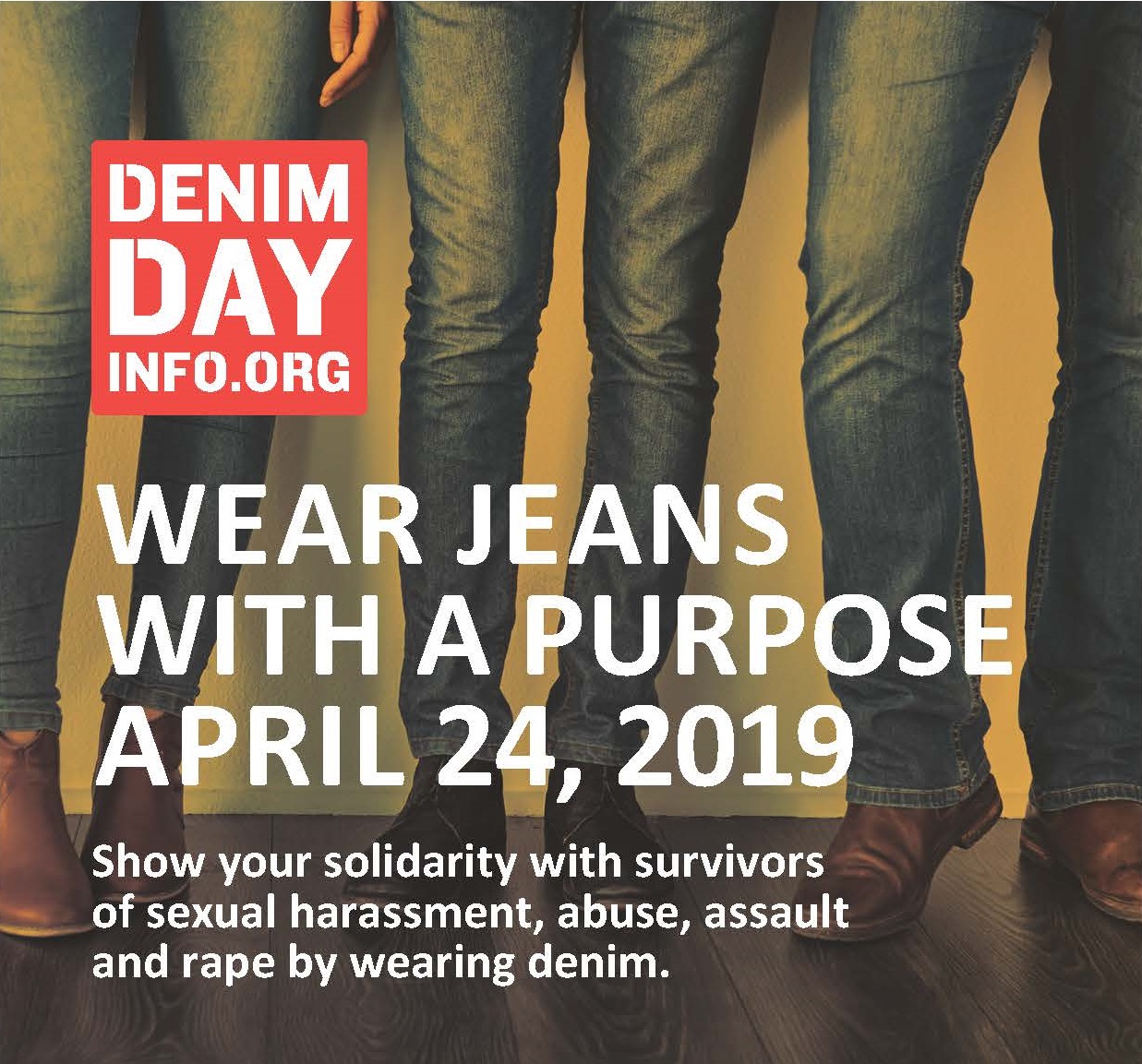
April is Sexual Assault Awareness Month (SAAM), which was first nationally observed in 2001, but has been used to raise awareness and organize against sexual- and gender-based violence since the 1970s. The Mayor’s Office on Domestic Violence and Sexual Assault (MODVSA) would like to acknowledge the important work of the Seattle Women’s Commission, the Coalition Ending Gender-Based Violence, and the King County Sexual Assault Resource Center for leading in our region to support survivors and work to eliminate sexual assault, rape, and gender-based violence in our communities.
As part of recognizing SAAM, City Councilmember Lisa Herbold crafted a Proclamation in partnership with the Women’s Commission honoring the month in Full Council on Monday, April 8. The MODVSA and the Coalition will also be co-sponsoring an educational event as part of Denim Day on April 24, 2019 at City Hall.

Harmful and erroneous attitudes about rape and sexual assault pervade our society. That is the reason why Denim Day exists – it is an anti-sexual violence campaign that is acknowledged worldwide every April. In Italy in 1992, a man raped a woman who was wearing a tight pair of jeans at the time. She reported the rape and the man was convicted. The case was appealed to the Italian Supreme Court. The court overturned the conviction in 1998 due to their belief that because the woman’s jeans were so tight, there is no way she could have been raped – in their view, she must have helped the man remove her jeans, thereby implying consent. The following day, the women of the Italian Parliament showed up to work wearing jeans in protest of the outrageous decision. This protest sparked an annual, worldwide Denim Day campaign against destructive attitudes about sexual assault.
Unfortunately, many harmful myths and misconceptions about rape and sexual violence remain in our collective conscience: myths about victims, myths about perpetrators, myths about causes of rape, myths about reactions to sexual violence, etc. Even though we are living in the #MeToo era, where we have declared #TimesUp on sexual predators, and even though many high-profile offenders are being held accountable for the harm they have done to others, we still have a long way to go.
For Indigenous survivors of sexual violence, justice is even further away. Native Americans are 2.5 times more likely to experience sexual assault and rape than women of any other ethnic group in the United States.[i] About 9 in 10 Native/American Indian victims of rape or sexual assault were estimated to have had assailants who were of a different race.[1] According to a study of 148 Native women in Seattle, 94% of participants had been raped or experienced sexual coercion in their lifetime.[2] Because of several laws preventing tribes from prosecuting non-Native offenders, many Native women who experience sexual violence never see justice. According to a study by the Government Accountability Office, US attorneys declined to prosecute 67% of sexual abuse, homicide, and other violent crimes against Native women.[3]
Racist attitudes about Indigenous communities and their approach to government and criminal prosecution threatened to halt the reauthorization of VAWA (the Violence Against Women Act – a federal law that provides support for many victim service agencies in the U.S.) in 2013 and again now, in 2019. In 2013, a provision was added to VAWA that allowed tribes to prosecute non-Indians for domestic violence, dating violence, and criminal violations of protection orders. This year, the proposed legislation would add child abuse, sexual assault, stalking, trafficking, obstruction of justice, and assaults against law enforcement officers to the crimes that tribes can prosecute against non-Indians.
As we know from two reports by the Urban Indian Health Institute, violence against and murder of Indigenous women in the Seattle area is an alarming problem that needs more attention.[4] To amplify the volume on this issue, this year, on April 24th, the City of Seattle is hosting an event titled Denim Day: Honoring Indigenous Women. The event features an incredible lineup of local Indigenous leaders and speakers who will be discussing the topic of sexual violence against Native women.
**Updated April 29, 2019 to include video from event below:
To further address sexual violence in our community, MODVSA invests more than $8.4 million in gender-based violence (GBV) prevention, intervention, systems enhancement, and offender accountability programs. The objectives of these investments are to ensure that survivors and their families find safety, ensure that all members of our community have access to critical services, build community support to end abuse and violence, and hold offenders accountable. Together, service providers in our region champion progress in our local, state, and national laws to ensure that all survivors are supported. Many of the funded agencies in our region provide specialized services for focus populations, such as the Native American community. By investing in a wide array of services that represent and serve traditionally under-funded communities, we know that we will be able to empower more survivors to lead the way for change and, ultimately, to end sexual violence.
[1] https://endrapeoncampus.org/new-page-3
[2] http://www.uihi.org/wp-content/uploads/sites/31/2018/08/UIHI_sexual-violence_r601_pagesFINAL.pdf
[3] https://www.gao.gov/new.items/d11167r.pdf
[4] http://www.uihi.org/resources/reports/
[i] https://www.hcn.org/articles/tribal-affairs-why-native-american-women-still-have-the-highest-rates-of-rape-and-assault